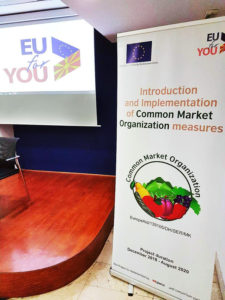
Improvement of Legislation, Control and Awareness in Food Safety, Animal Health and Welfare in Ukraine
The project aims to support the implementation of the Association Agreement’s provisions between the EU and Ukraine concerning food safety, animal health, and welfare.

Strengthening Vocational Qualifications Authority (VQA) and National Qualifications System (NQS) in Turkey
It can be claimed that the labour markets are required to ensure the provision of formal and non-formal education and training, to support life-long learning, strengthening the relationship between education and employment, and facilitating harmonization with the European Qualifications Framework (EQF). Within this scope, the project aimed to

Technical Assistance for Border Enforcement of Intellectual Property Rights (IPR) for Modernization of Turkish Customs Administration VIII
It is essential to modernize customs legislation and practices in line with the EU standards for proper and effective implementation of the Union Customs Code. In this context, the purpose of the project was to improve the administrative capacity of the Turkish Customs Administration, raise awareness and increase

Technical Assistance for Garment Training and Entrepreneurship Initiative (GATE for Women)
Women’s inequality in the labour sector has been an unsolved problem for generations. However, if women find the right support at the right time, it provides excellent results. Likewise, the overall aim of this project was to increase women’s employability and support women’s entrepreneurship by strengthening women’s vocational

Implementation of Common Market Organisations (CMO) in the Former Yugoslav Republic of Macedonia
The project’s overall objective is to increase marketing opportunities, economic development and overall productivity in the agricultural sector of North Macedonia while improving competitiveness of the agriculture sector in the country in line with EU accession requirements.

Technical Assistance for Promoting Registered Employment
Unregistered employment remains one of the critical concerns and significant challenges of the Turkish labour market. Even though recent years have seen a downward trend in unregistered employment, a substantial portion of Turkey’s workforce is still employed without being registered with the social security system. In this regard,

